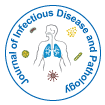当社グループは 3,000 以上の世界的なカンファレンスシリーズ 米国、ヨーロッパ、世界中で毎年イベントが開催されます。 1,000 のより科学的な学会からの支援を受けたアジア および 700 以上の オープン アクセスを発行ジャーナルには 50,000 人以上の著名人が掲載されており、科学者が編集委員として名高い
。オープンアクセスジャーナルはより多くの読者と引用を獲得
700 ジャーナル と 15,000,000 人の読者 各ジャーナルは 25,000 人以上の読者を獲得
インデックス付き
- Google スカラー
- レフシーク
- ハムダード大学
- エブスコ アリゾナ州
- ICMJE
役立つリンク
オープンアクセスジャーナル
このページをシェアする
抽象的な
Molecular Approaches to Detecting Herpes Simplex Virus Infections
Angus Lyras
This article explores the molecular approaches employed in the detection of Herpes Simplex Virus (HSV) infections, focusing on their significance in accurate diagnosis and clinical management. Molecular techniques, such as Polymerase Chain Reaction (PCR), Loop-Mediated Isothermal Amplification (LAMP), nucleic acid hybridization, Next-Generation Sequencing (NGS), Digital PCR (dPCR), and multiplex PCR panels, have revolutionized the field of HSV diagnostics. These methods offer high sensitivity, specificity, and rapid results, aiding in the differentiation of HSV types, viral load quantification, and monitoring disease progression. The application of these molecular tools enhances our ability to provide timely interventions, prevent transmission, and improve patient outcomes in HSV infections.

 English
English  Spanish
Spanish  Chinese
Chinese  Russian
Russian  German
German  French
French  Portuguese
Portuguese  Hindi
Hindi